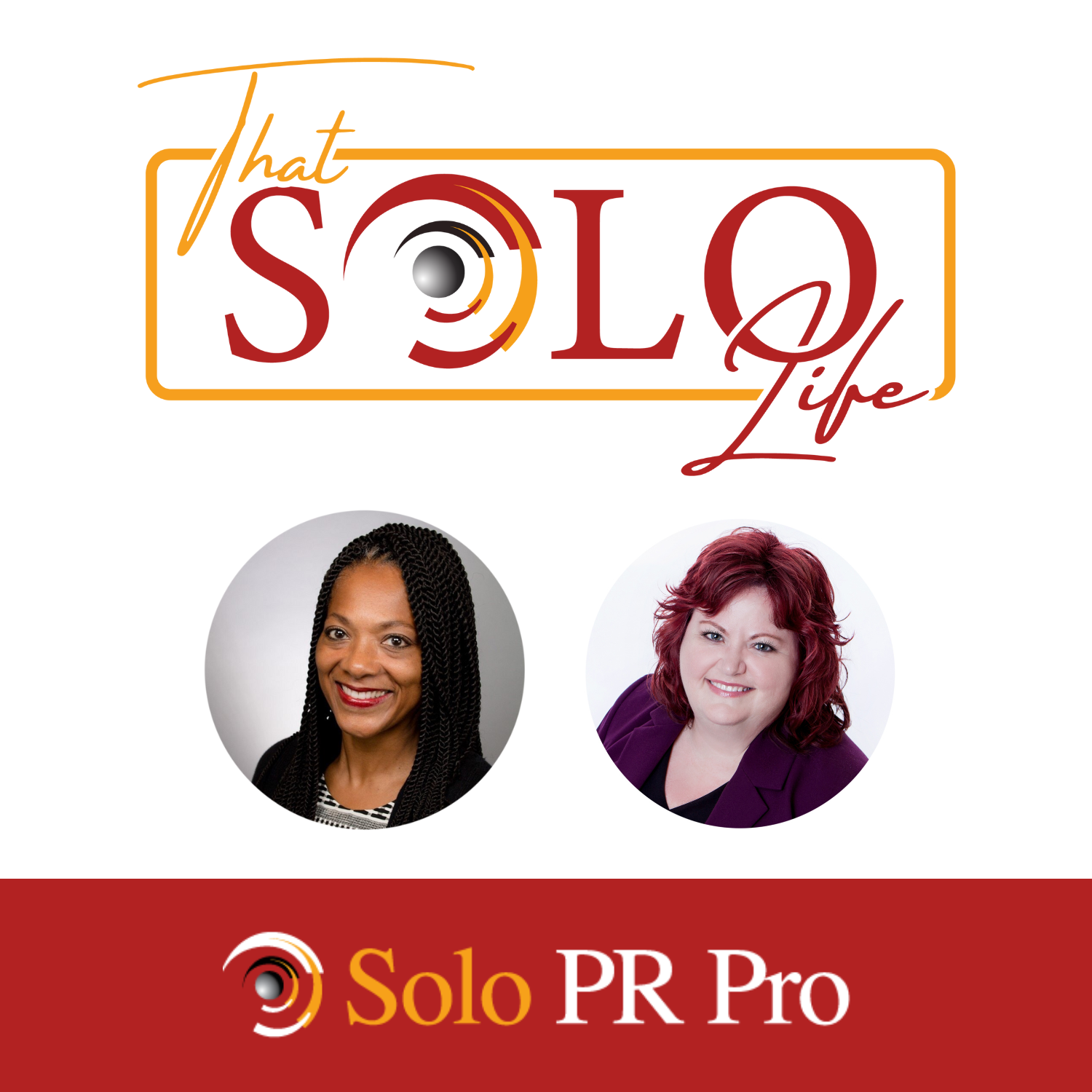
31.2K
Downloads
332
Episodes
That Solo Life: Co-hosted by Karen Swim, founder of Words for Hire, LLC and owner of Solo PR Pro and Michelle Kane, founder of VoiceMatters, LLC, we keep it real and talk about the topics that affect solo business owners in PR and Marketing and beyond. Learn more about Solo PR Pro: www.SoloPRPro.com
That Solo Life: Co-hosted by Karen Swim, founder of Words for Hire, LLC and owner of Solo PR Pro and Michelle Kane, founder of VoiceMatters, LLC, we keep it real and talk about the topics that affect solo business owners in PR and Marketing and beyond. Learn more about Solo PR Pro: www.SoloPRPro.com
Episodes
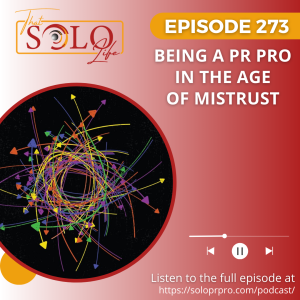
Monday Nov 04, 2024
Being a PR Pro in the Age of Mistrust
Monday Nov 04, 2024
Monday Nov 04, 2024
That Solo Life, Episode 273: Being a PR Pro in the Age of Mistrust
In this Episode
In this episode of That Solo Life, co-hosts Karen Swim, APR and Michelle Kane discuss the pressing issues of declining trust in institutions and how it impacts the practice and perception of the public relations industry.
The co-hosts discuss how the lack of trust has allowed for the proliferation of false narratives, making the PR professional's job more difficult and vital than ever. They emphasize the importance of PR professionals in protecting brand reputation, serving as strategic counselors, and being the crafters of the story that companies present to their audiences. The speakers call for the PR industry to do a better job of elevating the value and expertise of PR professionals, who possess crucial institutional knowledge and the ability to navigate the complex trust landscape.
Karen and Michelle kick off the episode with a look at the alarming decline in trust across various institutions, as highlighted by the Edelman Trust Barometer. Karen points out that this erosion of trust has led to a fragmented reality where individuals cling to beliefs that align with their perceptions, often disregarding factual information. This phenomenon is exacerbated by the rise of misinformation, which has become rampant in our digital age. The discussion explores how the internet, while a powerful tool for communication, has also created a level playing field for the spread of both truth and falsehoods.
PR professionals recognize the critical importance of their role in combating misinformation and maintaining brand trust. The work of PR pros goes beyond simply securing media placements; they are the storytellers who shape how organizations present themselves to the world. However, the hosts acknowledge the challenges faced in educating clients and the public about the true value of public relations.
Throughout the episode, Karen and Michielle highlight the necessity of having skilled communicators who can navigate crises and manage brand reputation. We stress that the decisions made today will have long-lasting effects, and without a strong PR strategy, organizations risk losing the trust of their audiences, including their own employees.
Karen and Michelle reflect on the unique expertise that comes from years of experience in the field. They advocate for the need to elevate the perception of the PR profession and ensure that our voices are heard. Listeners are encouraged to share their thoughts and questions, and reminded of the vital role they play in shaping narratives and fostering trust in an increasingly complex world.
Episode Timeline
00:00:00 - Introduction to That Solo Life
Welcome and introduction of hosts Michelle Kane and Karen Swim.
00:01:00 - The Decline of Trust in Institutions
Discussion on the decreasing trust in organizations and institutions over the past decade.
00:02:30 - Misinformation and Its Impact
Exploration of how misinformation spreads and its relationship with the lack of trust.
00:04:00 - The Role of Critical Thinking
The importance of critical thinking in discerning truth in the age of misinformation.
00:05:30 - The Challenge of Ideologies
How deeply held beliefs complicate the public relations landscape.
00:06:30 - The Importance of PR in Crisis Management
The vital role of public relations in protecting brand reputation and managing crises.
00:08:00 - Understanding the Role of PR Professionals
Discussion on the misconceptions about public relations and the need for better understanding of the profession.
00:09:30 - The Value of Storytelling in PR
The significance of storytelling in communicating a brand's identity and values.
00:10:30 - Elevating the PR Profession
The need for the public relations industry to advocate for itself and improve public perception.
00:11:30 - The Long-Term Impact of Trust Erosion
The potential long-term consequences of declining trust on organizations and society.
00:12:30 - Building and Maintaining Trust
The importance of consistent actions and accountability in maintaining brand trust.
00:14:00 - The Value of Institutional Knowledge
The significance of experience and institutional knowledge in the effectiveness of PR professionals.
00:16:00 - Conclusion and Call to Action
Wrap-up of the discussion and encouragement to share the podcast and engage with the hosts.
Resources:
- Edelman Trust Barometer
- How PR Pros Can Fight Fake News in 2024
- Everything Starts with Trust
- Disconnect, Division and the Urgent Need for Diligence in Communications
Enjoyed the episode?
Please leave a review here - even a sentence helps. Share and tag us (@SoloPR, @SoloPRPro) on social media so that we can thank you personally! Your support helps us keep bringing you insightful content every week. Thank you for tuning in!
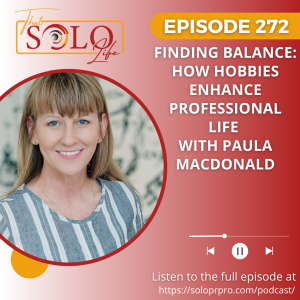
Monday Oct 28, 2024
Finding Balance: How Hobbies Enhance Professional Life with Paula MacDonald
Monday Oct 28, 2024
Monday Oct 28, 2024
That Solo Life, Episode 272: Finding Balance: How Hobbies Enhance Professional Life with Paula MacDonald
In this Episode
In this episode of That Solo Life , we had the pleasure of welcoming Paula MacDonald, a dynamic solo PR practitioner with a fascinating background in film production and technical theater. As the Principal Consultant of ImageSuite PR in St. Petersburg, Florida, Paula has successfully transitioned from an aspiring student filmmaker to a creative force in the public relations industry. Her unique storytelling skills, honed at the prestigious USC School of Cinematic Arts, allow her to serve a diverse range of clients in professional services, hospitality, sports, and agriculture.
During our conversation, Paula shared her inspiring journey and how her unconventional path has enriched her career in PR. We discussed the importance of diverse backgrounds in the field and how they can enhance creativity and adaptability. Paula also highlighted her involvement in the APR program, emphasizing how it provides a valuable framework for PR professionals looking to develop their careers.
One of the most exciting parts of our discussion was Paula's newfound passion for skateboarding, which she embraced after watching Tony Hawk's documentary. She candidly shared her experience of overcoming fears and self-limiting beliefs as she learned to skateboard as an adult. Paula's journey into this thrilling hobby not only brought her joy but also helped her manage anxiety and connect with a new community.
We explored how Paula's skateboarding hobby has influenced her professional life, encouraging her to take measured risks and embrace new challenges. She emphasized the importance of hobbies for personal growth and mental well-being, reminding us that pursuing interests outside of work can lead to greater creativity and clarity in our professional endeavors.
In addition to her skateboarding journey, Paula discussed her commitment to addressing gender inequity in the sport. She founded a nonprofit organization called Girls Skate Inc., aimed at bringing more girls and women into skateboarding. Through organizing events at the Skate Park of Tampa, Paula has successfully created a supportive community that fosters friendships and encourages participation among women of all ages.
As we wrapped up the episode, Paula shared her future aspirations, including her interest in puppetry and how she plans to combine her passions for skateboarding and early childhood education. Her enthusiasm and dedication to making a difference are truly inspiring.
This episode is a reminder that it's never too late to pursue new interests and that our hobbies can significantly enrich our lives, both personally and professionally. We encourage our listeners to embrace their passions and explore the possibilities that come with stepping outside their comfort zones.
Join us for this uplifting conversation with Paula MacDonald, and be inspired to take on new challenges in your own life!
About Paula MacDonald
Paula MacDonald's journey from aspiring student filmmaker to solo PR practitioner is a story of adaptability and creativity. With a background in technical theatre and a degree in film production from the prestigious USC School of Cinematic Arts, Paula brings a unique perspective of visual communication and storytelling to her PR work.
As the principal consultant of Image Suite PR in St. Petersburg, Florida, Paula leverages her storytelling skills to serve clients in professional services, hospitality, sports, and agriculture. Her leadership in PRSA, both at the chapter level and nationally, underscores her commitment to the public relations industry and to independent practitioners.
You can connect with Paula on her website, LinkedIn. Follow Girls-Sk8 online or Instagram.
Episode Timeline
00:00:00 - Introduction to That Solo Life Podcast
00:00:13 - Meet Paula MacDonald
00:00:46 - From Film Production to PR
00:02:40 - The Value of Diverse Backgrounds in PR
00:04:00 - The APR Program and Its Benefits
00:04:32 - Paula's New Hobby: Skateboarding
00:05:43 - Overcoming Fear in Pursuing Hobbies
00:08:04 - Connecting Hobbies to Professional Growth
00:10:02 - The Importance of Hobbies for Wellbeing
00:12:23 - Future Aspirations in Skateboarding
00:12:49 - Combining Passions: Skateboarding and Puppetry
00:14:31 - Addressing Gender Inequity in Skateboarding
00:15:52 - Launching Girls Skate Inc.
00:16:51 - Community Impact and Events
00:18:40 - The Benefits of Trying New Things
00:20:32 - Advice for Embracing Hobbies
00:22:13 - Connecting with Paula MacDonald
00:23:41 - Closing Thoughts and Future Plans
Resources:
Enjoyed the episode?
Please leave a review here - even a sentence helps. Share and tag us (@SoloPR, @SoloPRPro) on social media so that we can thank you personally! Your support helps us keep bringing you insightful content every week. Thank you for tuning in!
Say Thanks to Paula MacDonald!
If you liked this episode with Paula MacDonald please say thanks on LinkedIn!
Listen to the episode on our website, Apple Podcasts, Spotify, Amazon Music, or on your favorite podcast platform. You can also watch the interview on YouTube here.

Monday Oct 21, 2024
Why and How to Raise Your Solo PR Rates
Monday Oct 21, 2024
Monday Oct 21, 2024
That Solo Life, Episode 271: Why and How to Raise Your Solo PR Rates
In this Episode
In this episode of That Solo Life co-hosts Karen Swim, APR and Michelle Kane welcome back one of their favorite guests, Chip Griffin, from the Small Agency Growth Alliance. The episode centers around a crucial topic for PR professionals and marketers who work independently: raising rates.
We kick off the discussion by acknowledging a common challenge faced by solos and small agencies—undercharging for their services. Chip emphasizes that most professionals in this space undervalue their work and are often hesitant to ask for what they’re truly worth. He encourages listeners to consider raising their rates, asserting that the majority of solos are not charging enough.
The conversation then shifts to the mechanics of how to implement a rate increase without alienating existing clients. Chip shares that it’s essential to communicate any changes thoughtfully and to avoid abrupt or insignificant increases. Instead of small, incremental adjustments, he advocates for meaningful rate hikes that reflect the true value of the services provided.
Karen adds her insights, highlighting the importance of raising rates for new clients while also addressing the sensitive issue of existing clients. She suggests incorporating rate increases into year-end business reviews, where professionals can present a comprehensive look at past performance and future plans. This approach not only justifies the increase but also positions the professional as a strategic partner rather than just a vendor.
Throughout the episode, we discuss the importance of understanding one’s value and the need to think like a business owner rather than an employee. Chip points out that many solos treat their expenses like an employee would, failing to account for overhead and the true costs of doing business. He encourages listeners to adopt a value-based pricing model, which allows them to charge based on the expertise and results they deliver rather than just hourly rates.
As the conversation progresses, we touch on the significance of maintaining a healthy client mix and the necessity of ongoing business development. Chip reminds us that it’s vital to regularly assess our client relationships and to be proactive in seeking out higher-paying clients. He also warns against the pitfalls of complacency, urging listeners to avoid falling into autopilot mode with their client engagements.
In closing, we emphasize the importance of clear communication with clients regarding rate increases and the need to approach these discussions with confidence and strategy. Chip shares valuable resources available on his website, smallagencygrowth.com, encouraging listeners to seek help and not navigate their business challenges alone.
This episode is packed with actionable advice and insights that will inspire PR pros and marketers to evaluate their pricing strategies and take charge of their business growth. We hope you enjoy this enlightening conversation and feel empowered to raise your rates smartly and effectively!
About Chip Griffin
Chip Griffin is the Founder & CEO of Small Agency Growth Alliance (SAGA). He is a serial entrepreneur with a track record of building businesses that serve the PR and marketing community.
Chip helps small PR and marketing agency owners build businesses that they want to own. He works with them to grow profits, eliminate overwork, and improve their overall satisfaction.
As an experienced entrepreneur and agency owner himself, Chip shares the wisdom of his successes and the lessons from his failures. He understands the challenges and opportunities that face agency owners because he sat in the same chair and faced similar decisions.
You can email Chip at chip@chipgriffin.com if you’d like to talk.
Episode Timeline
00:00:00 - Introduction to Raising Rates Join Michelle, Karen, and guest Chip Griffin as they introduce the topic of raising rates for PR pros and marketers.
00:01:00 - The Importance of Valuing Your Work Chip discusses how many solos and small agencies undervalue their services and the need to raise rates.
00:02:00 - Strategies for Raising Rates Exploration of effective ways to raise rates without alienating clients, including communication strategies.
00:03:30 - New Clients vs. Existing Clients Karen emphasizes the importance of charging new clients higher rates and the challenges of raising rates for current clients.
00:05:00 - Understanding Your Value Discussion on determining your worth and setting rates based on desired income and expenses.
00:06:30 - Stop Thinking Like an Employee Chip advises against treating rate increases like salary raises and encourages a business mindset.
00:08:00 - Avoiding Small Increments The pitfalls of small, incremental price increases and the importance of making meaningful adjustments.
00:09:30 - Value-Based Pricing The benefits of value-based pricing over hourly rates and the importance of tracking effective hourly rates.
00:11:00 - Annual Business Reviews Karen shares her approach to incorporating rate increases into year-end business reviews for clients.
00:13:30 - Strategic Planning for Price Increases The advantages of presenting a new plan and budget to clients when discussing rate increases.
00:15:00 - Communication is Key The importance of clear communication with clients regarding rate increases and avoiding surprises.
00:17:00 - Assessing Client Relationships Chip discusses the need to evaluate client relationships and the risks of raising rates on certain clients.
00:19:00 - Client Mix and Profitability The significance of maintaining a balanced client mix and focusing on profitability rather than just revenue.
00:21:00 - The Importance of Business Development Encouragement to continuously seek new clients and opportunities to ensure business growth.
00:23:00 - Final Thoughts on Rate Increases Chip and Karen summarize the key takeaways on raising rates and the mindset needed for successful business management.
00:25:00 - Resources and Closing Remarks Chip shares where to find more resources and advice, and the hosts express gratitude for his insights.
Resources:
- Best Practices for Raising Rates (Solo PR Pro)
- Agency Health Assessment (SAGA)
Enjoyed the episode?
Please leave a review here - even a sentence helps. Share and tag us (@SoloPR, @SoloPRPro) on social media so that we can thank you personally! Your support helps us keep bringing you insightful content every week. Thank you for tuning in!
Say Thanks to Chip Griffin!
If you liked this episode with Chip Griffin please say thanks on LinkedIn.
Listen to the episode on our website, Apple Podcasts, Spotify, Amazon Music, or on your favorite podcast platform. You can also watch the interview on YouTube here.
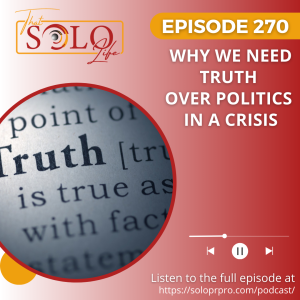
Monday Oct 14, 2024
Why We Need Truth Over Politics in a Crisis
Monday Oct 14, 2024
Monday Oct 14, 2024
That Solo Life, Episode 270: Why We Need Truth Over Politics in a Crisis
In this Episode
Recorded in the aftermath of Hurricane, this episode of "That Solo Life" podcast looks at the issue of misinformation in the wake of a crisis. Hosts, Karen Swim, APR and Michelle Kane examine the real world impact of mis-, mal- and disinformation during a regional crisis.
The hosts emphasize the need to avoid misinformation and politicization during such crises. They also emphasize the importance of having a decision framework in place to help clients navigate appropriate responses and avoid opportunistic behavior. The discussion underscores the role of PR professionals in informing the public, educating on discerning fact from fiction, and mobilizing practical assistance for those in need.
The discussion examines the rampant misinformation that often surfaces during crises, stressing. the need for accurate information Karen and Michelle assert that a human crisis should not be politicized.
The importance of providing factual support to those in need rather than engaging in political games or spreading false narratives is stressed.
Listeners are reminded of the importance of being a reliable source of information and support during crises. We encourage PR pros to step up, educate the public, and focus on helping those in need. We express our gratitude to our listeners for their dedication to the profession and invite them to share their thoughts and feedback.
Join us as we navigate these critical conversations and strive to uplift our communities in times of need. Thank you for tuning in to That Solo Life!
Episode Timeline:
00:00:00 - Introduction and Acknowledgment of Hurricane Helene
The hosts introduce themselves and express their support for those affected by Hurricane Helene.
00:01:10 - Support for PR Pros Affected by the Hurricane
Discussion on the importance of community support for PR professionals impacted by the disaster.
00:02:11 - Addressing Misinformation During Crises
The hosts emphasize the need to combat myths and disinformation during crises, highlighting the importance of accurate information.
00:03:53 - The Importance of Truth in Communication
A conversation about the erosion of trust in institutions and the necessity of truthful communication in PR.
00:05:22 - The Role of PR Professionals in Educating the Public
Discussion on how PR pros can help the public discern fact from fiction and find reliable resources.
00:06:27 - Disasters Are Not PR Opportunities
The hosts express their frustration with brands leveraging disasters for marketing purposes.
00:07:35 - Humanitarian Focus Over Marketing
A call to action for organizations to focus on genuine help rather than opportunistic marketing during crises.
00:09:32 - The Need for a Decision Framework in PR
The importance of having a decision-making framework to guide clients in responding to crises appropriately.
00:12:14 - The Role of PR Professionals as Safety Patrols
The hosts liken their role to that of safety patrols, emphasizing their responsibility to guide clients through challenging situations.
00:13:01 - Conclusion and Call to Action
Wrapping up the episode with encouragement for PR pros and a reminder to share the podcast and provide feedback.
Resources:
- Carnegie Endowment for International Peace: Disaster-Related Misinformation Isn’t Unique to Helene and Milton
- Institute for Strategic Dialogue: Hurricane Helene brews up storm of online falsehoods and threats
- FEMA.gov: Addressing Hurricane Helene Rumors and Scams
Enjoyed the episode?
Please leave a review here - even a sentence helps. Share and tag us (@SoloPR, @SoloPRPro) on social media so that we can thank you personally! Your support helps us keep bringing you insightful content every week. Thank you for tuning in!
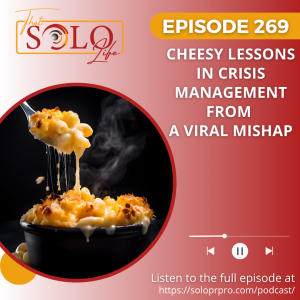
Monday Oct 07, 2024
Cheesy Lessons In Crisis Management From A Viral Mishap
Monday Oct 07, 2024
Monday Oct 07, 2024
That Solo Life, Episode 269: Cheesy Lessons In Crisis Management From A Viral Mishap
In this Episode
In episode 269 of “That Solo Life” podcast, Karen Swim, APR and Michelle Kane discuss the viral video of a customer receiving a mac and cheese order without the macaroni, and how the business handled the situation by responding with a humorous TikTok video. The hosts highlight the important lessons for PR and marketing professionals, including the value of social media monitoring and responding appropriately to negative sentiment. They also emphasize the importance of clear internal communication and ensuring employees understand the products and services they are representing.
The episode explores the importance of effective communication in the face of unexpected challenges. The hosts explore lessons from the brand’s quick response which was genuine and cheeky
Karen and Michelle talk about the significance of having a strong social media presence and the necessity of listening tools to monitor brand mentions and customer sentiment. They discuss how brands can miss opportunities to engage with their audience, especially when positive feedback is shared. By actively listening and responding, businesses can foster a sense of community and connection with their customers.
The hosts also touch on the internal communication lessons that can be learned from the incident, highlighting the importance of clarity in messaging. We share anecdotes about the need for employees to fully understand the products or services they represent, ensuring they can effectively communicate with customers.
Listeners are encouraged to reflect on the value of effective communication, both internally and externally, and to consider how they can apply these lessons in their own practices.
Episode Timeline:
00:00:00 - Welcome to That Solo Life
Introduction to the podcast and hosts, Michelle Kane and Karen Swim.
00:00:21 - Hello Fall!
Discussion about the arrival of fall and the changing seasons.
00:00:47 - The Mac and Cheese Mishap
Introduction to the viral clip of a woman receiving an incomplete mac and cheese order.
00:01:49 - Lessons in Crisis Communication
Exploring the business response to the viral video and its implications for PR and marketing.
00:02:54 - Engaging on Social Media
The importance of responding on the same platforms where negative sentiment arises.
00:04:16 - Investing in Listening Tools
The necessity of social media listening tools for brands to monitor sentiment.
00:05:52 - Understanding Client Needs
Discussing the importance of educating clients about the value of listening tools.
00:07:32 - Community Engagement
The benefits of local businesses engaging with their community on social media.
00:08:27 - Challenges for Smaller Brands
Addressing the struggles smaller brands face in monitoring their online presence.
00:09:24 - The Importance of Clear Communication
Highlighting the need for clarity in both internal and external communications.
00:10:10 - Responding with Humor
The effectiveness of a light-hearted response to customer complaints.
00:12:26 - Internal Communication Lessons
The importance of ensuring all employees understand menu items and services.
00:15:12 - Employee Training and Experience
The necessity for employees to have firsthand experience with products and services.
00:17:08 - Closing Thoughts
Encouragement to enjoy mac and cheese and a reminder to share the podcast.
Resources:
- USA Today: California Pizza Kitchen offers chain-wide mac and cheese deal after viral order blunder (Includes customer TikTok Video)
Enjoyed the episode?
Please leave a review here - even a sentence helps. Share and tag us (@SoloPR, @SoloPRPro) on social media so that we can thank you personally! Your support helps us keep bringing you insightful content every week. Thank you for tuning in!

Monday Sep 30, 2024
Why Media Literacy is Crucial in an Age of Untruths
Monday Sep 30, 2024
Monday Sep 30, 2024
That Solo Life, Episode 268: Why Media Literacy is Crucial in an Age of Untruths
In this Episode
In this episode of That Solo Life, co-hosts Karen Swim, APR and Michelle Kaen discuss the importance of media literacy and combating misinformation, particularly for public relations professionals. The hosts highlight how the rise of AI and deepfake technology has made it increasingly difficult to discern truth from fiction. They emphasize the responsibility of PR pros to educate their clients and the public on verifying information, monitoring for misuse of brand assets, and providing tools to fact-check claims. The discussion also touches on the role of social media platforms in addressing the spread of misinformation and the need for collective action by companies and organizations to curtail the problem.
The hosts reflect on the current media landscape, especially during an election year when the stakes are high, and the potential for misinformation is rampant. Today’s discussion highlights the responsibility we have as PR pros to not only stay informed ourselves but also to educate our clients and the public about the importance of media literacy. Misinformation can affect brands in both significant and subtle ways, and it is our duty to help our clients navigate this complex environment.
Throughout the episode, Karen and Michelle explore practical strategies for enhancing media literacy among clients and their audiences. This includes implementing robust monitoring systems to track brand mentions and ensuring that content produced is clearly marked to establish ownership and authenticity. The discussion includes the importance of equipping the public with tools to fact-check information, such as linking to credible sources and encouraging critical thinking.
As Michelle and Karen delve deeper, they address the psychological aspects of how people consume information, particularly how personal beliefs can cloud judgment regarding what is considered "true" or "fake." We share anecdotes about the impact of negative reviews and misinformation on local businesses, underscoring the real-world consequences of unchecked falsehoods.
The conversation takes a broader turn as they advocate for a collective effort within the PR industry to combat misinformation. Karen and Michelle envision a future where every brand provides resources to help the public discern fact from fiction, ultimately fostering a more informed society. They call on social media platforms to take a more proactive role in identifying and flagging misleading content, emphasizing that doing the right thing is essential for long-term success.
In closing, listeners are reminded that while the fight against misinformation can feel overwhelming, every small effort counts. PR professionals are encouraged to join this important mission, armed with their"teaspoons" and commitment to truth.
If you found value in our discussion, please share this episode and connect with us at soloprpro.com for more insights and past episodes. Thank you for tuning in to That Solo Life!
Episode Timeline:
00:00:00 - Introduction to Media Literacy Discussion on the importance of media literacy in PR and marketing, especially during an election year.
00:02:00 - The Role of AI in Media Literacy Exploration of how AI advancements impact the discernment of truth and accuracy in media.
00:04:00 - Equipping Clients and Publics Strategies for PR pros to help clients monitor their brand and educate the public on fact-checking.
00:06:00 - The Challenge of Misinformation Discussion on the prevalence of misinformation and the responsibility of brands to combat it.
00:08:00 - Belief Systems and Information Consumption Analysis of how personal beliefs affect the perception of information and the importance of critical thinking.
00:10:00 - The Impact of Fake Reviews Examination of how fake reviews can harm brands and the need for consumers to discern authenticity.
00:12:00 - Ethics in PR and Media The ethical implications of spreading misinformation and the responsibility of PR professionals to advocate for truth.
00:14:00 - The Role of Social Media Platforms Discussion on the responsibility of social media companies to combat misinformation and protect users.
00:15:00 - Conclusion and Call to Action Encouragement for PR pros to contribute to the fight against misinformation and promote media literacy.
Resources:
- Resources for PR Pros: News Literacy Project
- Tackling Ai:The Battle Against Misinformation with Axel Ebermann - Episode 160
- Battling Misinformation: How PR Pros Can Counter AI Misinformation
Enjoyed the episode?
Please leave a review here - even a sentence helps. Share and tag us (@SoloPR, @SoloPRPro) on social media so that we can thank you personally! Your support helps us keep bringing you insightful content every week. Thank you for tuning in!
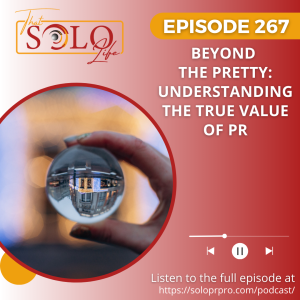
Monday Sep 23, 2024
Beyond the Pretty: Understanding the True Value of PR
Monday Sep 23, 2024
Monday Sep 23, 2024
That Solo Life, Episode 267: Beyond the Pretty: Understanding the True Value of PR
In this Episode
In this episode of That Solo Life, co-hosts Karen Swim, APR and Michelle Kane dive into the evolving landscape of public relations and marketing, particularly focusing on the value of strategic thinking in our professions. We kick off the conversation by reflecting on how the perception of PR has shifted over the years—from being seen as mere party planners to now being equated with the creation of visually appealing content, such as social media reels.
Michelle highlights the importance of recognizing the intent and expertise that goes into crafting effective communication strategies, emphasizing that beautiful outputs are often the result of meticulous planning and seasoned thought. Karen adds to this by discussing the challenges faced by PR professionals and marketers in a world where the demand for our skills is being eroded by the rise of multi-hyphenates and the casual approach some take towards our professions.
We explore the implications of this shift, particularly how it affects our livelihoods and the perception of our expertise. Both hosts share personal experiences, noting that many in the field have taken non-traditional paths to their current roles, which adds to the complexity of how our work is valued.
The discussion also touches on the role of AI and the allure of quick fixes in marketing and PR, contrasting these with the deep, analytical work that truly drives outcomes. We acknowledge the frustrations of journalists, especially in the political realm, as they navigate a landscape where content creators are gaining prominence.
As we reflect on the importance of our roles, we emphasize the need for PR professionals and marketers to elevate their own standards and educate others about the true nature of our work. We advocate for a collaborative approach within the industry, aiming to uplift the entire profession rather than create divisions between independents and those in traditional roles.
Throughout the episode, we stress that clients will always need skilled professionals to tell their stories effectively. We highlight the intricate thought processes that go into our work, from crafting headlines to managing crises, and the necessity of being recognized for the value we bring.
In closing, we encourage our listeners to take pride in their profession and to share this episode with others who may benefit from understanding the depth and complexity of what we do. Join us as we continue to champion the importance of strategic thinking in PR and marketing, and strive to preserve the integrity of our professions for future generations.
Episode Timeline:
- 00:00:00 - Introduction to That Solo Life
- 00:00:18 - The Value of PR and Marketing
- 00:00:48 - Misconceptions About PR and Content Creation
- 00:02:05 - The Importance of Expertise in PR and Marketing
- 00:03:43 - The Evolving Landscape of PR and Journalism
- 00:05:00 - The Complexity Behind Simple Outputs
- 00:06:31 - The Role of Independents in the Industry
- 00:08:31 - The Need for Storytelling and Guidance
- 00:09:41 - Raising Standards in PR and Marketing
- 00:10:42 - Job Misconceptions and Industry Challenges
- 00:12:10 - The Value of PR Professionals
- 00:13:01 - Conclusion and Call to Action
Enjoyed the episode?
Please leave a review here - even a sentence helps. Share and tag us (@SoloPR, @SoloPRPro) on social media so that we can thank you personally! Your support helps us keep bringing you insightful content every week. Thank you for tuning in!
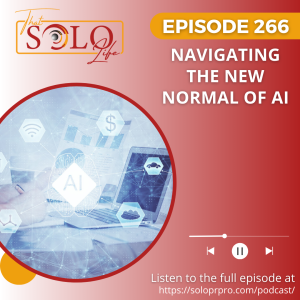
Monday Sep 16, 2024
Navigating the New Normal of AI
Monday Sep 16, 2024
Monday Sep 16, 2024
That Solo Life, Episode 266: Navigating the New Normal of AI
In this Episode
In this episode of "That Solo Life," co-hosts Karen Swim, APR and Michelle Kane delve into the complex and evolving relationship between artificial intelligence (AI) and the world of public relations (PR). The episode kicks off with a discussion about the recent controversy surrounding the NaNoWriMo project and its use of AI, sparking a broader conversation about the role of AI as a tool in the PR profession.
Karen and Michelle emphasize the inevitability of AI's presence in the industry and stress the importance of embracing and shaping its use rather than resisting it. They highlight the need for PR professionals to lead the way in defining ethical practices and addressing issues such as inherent biases and copyright protection in the context of AI-generated content.
The hosts acknowledge the potential benefits of AI in streamlining certain tasks, such as research analysis and content generation, but also caution against relying solely on AI without human intelligence and guidance. They emphasize the importance of critical thinking, fact-checking, and maintaining ethical standards in the face of AI's increasing influence on the media landscape.
The conversation extends to the role of journalists and PR professionals in upholding integrity and accuracy in their work, amidst concerns about misinformation and unethical practices in the industry. Michelle and Karen underscore the vital role of media literacy and ethical decision-making in preserving the credibility and impact of journalism and PR.
As the episode concludes, the hosts encourage listeners to engage in civil discourse, share their insights, and consider joining the Solo PR Pro community for further professional development and networking opportunities. The episode serves as a call to action for PR professionals to navigate the evolving landscape of AI with integrity, critical thinking, and a commitment to ethical practices.
Episode Timeline:
- Introduction: 00:00:02-00:00:41
- Discussion on AI in PR and Marketing: 00:01:08-00:09:58
- Concerns about Misinformation and Ethics: 00:09:58-00:11:36
- Journalism and Integrity: 00:11:36-00:13:50
- Media Literacy and Importance of Ethics: 00:14:14-00:15:53
AI Resources:
- The Battle Against Misinformation with Axel Ebermann
- Almost Timely Newsletter
- Michael Smart’s AI Assisted PR Newsletter
- Getting Started with Generative AI
Enjoyed the episode?
Please leave a review here - even a sentence helps. Share and tag us (@SoloPR, @SoloPRPro) on social media so that we can thank you personally! Your support helps us keep bringing you insightful content every week. Thank you for tuning in!

Monday Sep 09, 2024
How PR Pros Can Leverage that Back to School Energy
Monday Sep 09, 2024
Monday Sep 09, 2024
That Solo Life, Episode 265: How PR Pros Can Leverage that Back to School Energy
In this Episode
It’s back to school season and for Solo PR Pros it’s a great time to refresh and reset. In today’s episode Karen Swim, APR and Michelle Kane dive into the topic of embracing a back-to-school mindset as solopreneurs. As the fall season approaches, they discuss the importance of self-care, professional development, and rejuvenation in order to stay sharp and serve clients effectively.
The hosts highlight the significance of taking time for personal growth, whether through workshops, online courses, or simply revisiting the basics of our profession. They emphasize the value of setting aside dedicated time for reflection and creative thinking, stressing the need for solopreneurs to prioritize mental well-being amidst the constant influx of information and responsibilities.
Karen and Michelle also touch on the idea of incorporating playtime and self-compliments into daily routines, drawing parallels between the joy of back-to-school shopping and the potential for a wardrobe refresh to boost energy and confidence. They encourage listeners to find small ways to infuse excitement and positivity into their work lives, even in the absence of traditional office interactions.
Throughout the episode, the hosts share personal anecdotes and insights, underscoring the challenges and rewards of working independently. They invite listeners to share their own back-to-school tips and experiences, fostering a sense of community and collaboration within the solopreneur space.
As the episode concludes, Michelle and Karen express their hopes for a successful end to the year, both professionally and personally. They encourage listeners to prioritize self-care and growth, reminding them that the freedom of solopreneurship allows for flexibility and choice in how they approach their work and well-being.
Listeners are invited to share their feedback and suggestions for future episodes, as the hosts look forward to continuing the conversation on navigating the solo professional journey. Tune in to "That Solo Life" for more insights, tips, and inspiration for thriving as a Solo PR Pro in today's dynamic landscape.
Episode Timeline
00:00:00 - Introduction and Back to School Theme
00:05:30 - Importance of Taking Breaks and Decompressing
00:11:12 - Refreshing Your Wardrobe for Fall
00:14:30 - Importance of Laughter and Mental Health
00:15:26 - Embracing Freedom and Choices in Solo Work
Enjoyed the episode?
Please leave a review here - even a sentence helps. Share and tag us (@SoloPR, @SoloPRPro) on social media so that we can thank you personally! Your support helps us keep bringing you insightful content every week. Thank you for tuning in!

Monday Sep 02, 2024
The Client Conversations You Need to Have Now
Monday Sep 02, 2024
Monday Sep 02, 2024
In this Episode
In this episode of "That Solo Life," co-hosts Karen Swim, APR and Michelle Kane dive into the importance of year-end client conversations for PR professionals and marketers. As the final quarter of the year approaches, the hosts emphasize the significance of checking in with clients to ensure alignment, satisfaction, and strategic planning for the upcoming year.
The hosts discuss the necessity of conducting a health check with clients, focusing on both the health of the client's business and the effectiveness of the PR program. They stress the value of open and honest conversations, allowing for feedback and addressing any missed opportunities or areas for improvement.
Karen and Michelle highlight the importance of building strong relationships with clients beyond transactional interactions. They emphasize the role of PR professionals in supporting client growth, career development, and overall success.
As the conversation progresses, the hosts delve into the process of presenting year-end recaps and program recommendations to clients. They suggest incorporating a SWOT analysis to identify strengths, weaknesses, opportunities, and threats, providing a comprehensive overview of the client's PR program.
Additionally, Michelle and Karen encourage PR professionals to confidently discuss budget increases with clients, emphasizing the need to align rates with the evolving costs of doing business. They stress the importance of demonstrating value, communicating achievements, and proactively addressing client needs to strengthen trust and foster long-term partnerships.
In conclusion, the hosts remind listeners to prioritize effective communication, strategic planning, and ongoing client engagement as they navigate year-end conversations and prepare for the new year ahead. They invite listeners to share feedback, engage with the Solo PR Pro community, and continue learning and growing in their solo PR and marketing endeavors.
Episode Timeline
00:00:00 - Introduction and Setting the Stage
00:05:30 - Importance of Health Check Conversations with Clients
00:12:01 - Recommendations and Budget Conversations
00:13:35 - SWOT Analysis and Strategic Counsel
00:16:33 - Communicating Value and Recap to Clients
00:17:48 - Conclusion and Call to Action
Enjoyed the episode?
Please leave a review here - even a sentence helps. Share and tag us (@SoloPR, @SoloPRPro) on social media so that we can thank you personally! Your support helps us keep bringing you insightful content every week. Thank you for tuning in!
